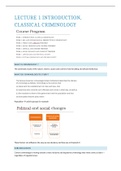LECTURE 1 INTRODUCTION,
CLASSICAL CRIMINOLOGY
WHAT IS CRIMINOLOGY ?
The systematic study of the nature, extent, causes and control of law-breaking and deviant behaviour.
WHAT DO CRIMINOLOGISTS STUDY?
Population activist groups for example
These factors can influence the way we see deviancy and how we act towards it
SUBCONCLUSION
Current criminology is moving toward a more inclusive and expansive criminology that views crime as harm —
regardless of regulatory law.
,Comparative and global criminology is moving toward recognizing the interconnectedness of people in
different countries and cultures
CLASSICAL PERIOD 17 T H CENTURY
The idea was that people were born as 'social types' with associated rights and privileges such as
status, wealth and power (e.g. landed gentry and serfs).
Absolute monarchies, and "justice" was arbitrary, barbaric and very strict
Corporal punishment and death penalty widely used (e.g. the gallows)
Torture to force a confession
People were born in a particular position in terms of power and wealth
Aristocratic vs poor
Growth of the middle class, wanted to cover their security with a new type of philosophy non elite
but more powerful than peasants, new administrative system classical period
Classical period : more predictable and reliable, which an secure the security of the new classes
CATEGORIES OF THE POOR
Deserving vs undeserving people in society
To treat people on a more fair level
Poor: categories of people who does deserve penalties and those who do not
Indecent poor: morally less justified to commit crime
THE ENLIGHTMENT
An important change took place in the 17th century: utilitarian philosophers recognized the injustices
of the legal and political system.
The primary focus of utilitarian philosophers was to transform arbitrary criminal law into a fair, equal,
and humanitarian system.
CESARE BECCARIA (1738-1794)
Humans are born as free, equal, and rational individuals with both natural rights (e.g. private property)
and natural qualities (e.g. freedom of reason).
o Free will
Individual sovereignty; individual rights take precedence over the state – laws to protect individuals.
Elected legislators to be represented by the people.
Aristocratic
“We shouldn’t consider people on the basis of class and power” fair treatment
, The social contract, the legitimacy of the state's authority over the individual, arises from a contract
concluded between the two; certain freedoms are given up, including the right to play in their own
court, in exchange for protection.
Crime breaks the social contract
Responsibility to protect the innocent and convict the guilty law should serve the social contract
Shift to new administrative system
o Idea of freedom
o Subsidiarity principle
o Proportionality principle
o Legality principle
o Weigh costs and benefits
JEREMY BENTHAM (1748-1832)
Humans are rational beings whose laws must prohibit harmful behaviour in order to increase the
happiness of the community.
Founder of utilitarian school: seeking as much happiness as possible and avoiding bad experiences
the goal of society should be “The greatest happiness shared by the greatest number.”
Penalties are higher for repeat offenders
o Beccaria: if you steal a bread ten times, you get ten times the same punishment
o Bentham: higher penalties for repeat offenders
o 3 strikes and out policy dangerous consequence of this idea
Punishment proportional to crime
More prison penalties, less physical harms
Since punishment also inflicts damage, this is only fair if it reduces a greater evil.
Rejected the death penalty, as it would do more harm than good and therefore violates the principle
of utilitarianism.
Rational system of supervision in a prison
Hedonistic (pain-pleasure) calculus
o Choose behaviours that bring pleasure
o Avoid behaviours that bring pain
Punishment depends on ability to understand repercussions of actions
BENTHAM AND HIS PANOPTICON
Ultimate disciplinary prison:
o Inmates cannot see who is in central tower and/or they are being watched
Inmates are thought the behave better in this type of prison and it is thought that this has a positive
effect when they are released
, LIMITATIONS OF THE CLASSICAL THEORIES?
Are individuals treated equally on the basis of intellectual ability, age, mental capacity, and gender
today?
Does this fit in a system in which a number of people receive more prosperity (welvaart) while all
persons are formally equal?
Why do some people commit more crimes than others, when they would all have the same sense?
Classical criminology: Focus on how tot treat people who are breaking the social contract
Can we really treat everybody in terms of freedom, decision making and ratio as equal?
Would they all have the same sense when committing crime?
DETERRENCE THEORY
Punishments must be:
Severe (severe enough to balance out the impact of the crime)
Certain (individuals must know the punishment is certain to come if they commit the criminal act)
Swift (the punishment must come swiftly after the crime has been committed, so the two are
inherently tied together)
Specific deterrence applies by reoffending decisions by individual offenders
General deterrence the effects of legal punishment on the general public (potential offenders)
THE SHIFT TO JUSTICE THEORY
Beginning in the 19th century, Darwinian evolutionary ideas, science and technology promised to
"liberate" mankind from the philosophical perspectives of the Enlightenment.
Specific scientific rules, such as observation and manipulation of variables were developed.
Violators were diagnosed and deemed to require treatment based on their diagnosis.
Shift from deterrence to rehabilitation (justice)
RATIONAL CHOICE THEORY
Rational choice theory explains how some people consciously and rationally choose to commit crimes.
Potential offenders, with free will, consider the net benefits of committing crimes (cost-benefits).
Circumstances, situations and possibilities influence decisions, as these factors are taken into account
in the calculation of the cost-benefit analyses of the risks (deterrence).
cost-benefit decisions
Clarke: increase of costs would decrease the interest in crime balance shifts





